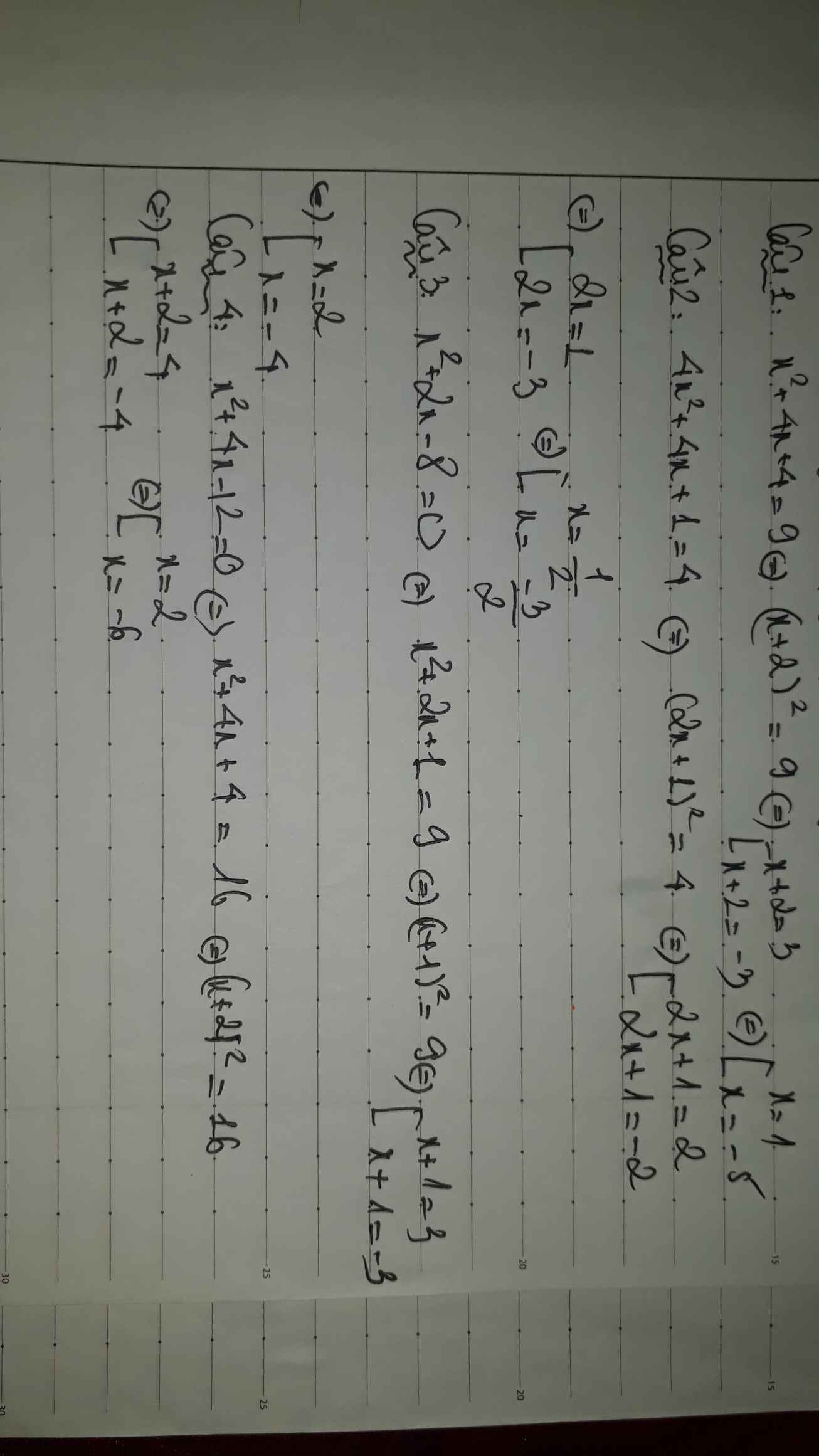

Hãy nhập câu hỏi của bạn vào đây, nếu là tài khoản VIP, bạn sẽ được ưu tiên trả lời.




1)⇔x2+1x-3x+3=0
⇔x(x+1)-3(x+1)=0
⇔(x+1)(x-3)=0
⇔x+1=0 hoặc x-3=0
⇔x=-1 hoặc x=3
4)⇔x(1+5x)=0
⇔x=0 hoặc 1+5x=0
⇔x=0 hoặc 5x=-1
⇔x=0 hoặc x=-0.2

Tập xác định của phương trình
2
Rút gọn thừa số chung
3
Biệt thức
4
Biệt thức
5
Nghiệm

chắc bn nảy hỏi lun cả bài tâp về nhà quá, làm km 1 câu
a) = a+a+a + a +a +1 -a -a -a = a(a+a+1) +(a+a+1) - a(a+a+1)= (a+a+1)(a-a+1)
tự bn thêm mũ 4;3;2 vào được là bn làm dc cac câu sau

1) \(\left(5x-4\right)\left(4x+6\right)=0\)
\(\Leftrightarrow\left[{}\begin{matrix}5x-4=0\\4x-6=0\end{matrix}\right.\Leftrightarrow\left[{}\begin{matrix}5x=4\\4x=6\end{matrix}\right.\Leftrightarrow\left[{}\begin{matrix}x=\dfrac{4}{5}\\x=\dfrac{3}{2}\end{matrix}\right.\)
Vậy phương trình có tập nghiệm S = \(\left\{\dfrac{4}{5};\dfrac{3}{2}\right\}\)
2) \(\left(4x-10\right)\left(24+5x\right)=0\)
\(\Leftrightarrow\left[{}\begin{matrix}4x-10=0\\24+5x=0\end{matrix}\right.\Leftrightarrow\left[{}\begin{matrix}4x=10\\5x=-24\end{matrix}\right.\Leftrightarrow\left[{}\begin{matrix}x=\dfrac{5}{2}\\x=\dfrac{-24}{5}\end{matrix}\right.\)
Vậy phương trình có tập nghiệm S = \(\left\{\dfrac{5}{2};\dfrac{-24}{5}\right\}\)
3) \(\left(x-3\right)\left(2x+1\right)=0\)
\(\Leftrightarrow\left[{}\begin{matrix}x-3=0\\2x+1=0\end{matrix}\right.\Leftrightarrow\left[{}\begin{matrix}x=3\\2x=-1\end{matrix}\right.\Leftrightarrow\left[{}\begin{matrix}x=3\\x=\dfrac{-1}{2}\end{matrix}\right.\)
Vậy phương trình có tập nghiệm S = \(\left\{3;\dfrac{-1}{2}\right\}\)

\(x\left(2x-7\right)-4x+14=0\Leftrightarrow\left(x-2\right)\left(2x-7\right)=0\Leftrightarrow\left[{}\begin{matrix}x-2=0\\2x-7=0\end{matrix}\right.\Leftrightarrow\left[{}\begin{matrix}x=2\\x=\frac{7}{2}\end{matrix}\right.\)
\(x^2\left(x-1\right)-4\left(x-1\right)=\left(x^2-4\right)\left(x-1\right)=\left(x-2\right)\left(x+2\right)\left(x-1\right)=0\Leftrightarrow\left[{}\begin{matrix}x-2=0\\x+2=0\\x-1=0\end{matrix}\right.\Leftrightarrow\left[{}\begin{matrix}x=2\\x=-2\\x=1\end{matrix}\right.\)
\(x^4-x^3-x^2+x=x\left(x^3+1\right)-x^2\left(x+1\right)=x\left(x+1\right)\left(x^2-x+1-x^2\right)=x\left(x+1\right)\left(1-x\right)=0\Leftrightarrow\left[{}\begin{matrix}x=0\\x+1=0\\1-x\end{matrix}\right.\Leftrightarrow\left[{}\begin{matrix}x=0\\x=\pm1\end{matrix}\right.\)
a) \(x\left(2x-7\right)-4x+14-0\Leftrightarrow2x^2-11x+14=0\Leftrightarrow2x^2-4x-7x+14=0\Leftrightarrow2x\left(x-2\right)-7\left(x-2\right)=0\Leftrightarrow\left(2x-7\right)\left(x-2\right)=0\Leftrightarrow\left[{}\begin{matrix}x=3,5\\x=2\end{matrix}\right.\)
b) \(x^2\left(x-1\right)-4x+4=0\Leftrightarrow x^2\left(x-1\right)-4\left(x-1\right)=0\Leftrightarrow\left(x-1\right)\left(x-2\right)\left(x+2\right)=0\Leftrightarrow\left[{}\begin{matrix}x=1\\x=2\\x=-2\end{matrix}\right.\)
c) \(x+x^2-x^3-x^4=0\Leftrightarrow x\left(x^3+x^2-x-1\right)=0\Leftrightarrow x\left[x\left(x^2-1\right)+\left(x^2-1\right)\right]=0\Leftrightarrow x\left(x+1\right)\left(x^2-1\right)=0\Leftrightarrow\left[{}\begin{matrix}x=0\\x=1\\x=-1\end{matrix}\right.\)
d) \(2x^3+3x^2+2x+3=0\Leftrightarrow x^2\left(2x+3\right)+2x+3=0\Leftrightarrow\left(x^2+1\right)\left(2x+3\right)=0\Leftrightarrow x=-1,5\left(x^2+1>0\forall x\right)\)
e) \(4x^2-25-\left(2x-5\right)\left(2x+7\right)=0\Leftrightarrow\left(2x-5\right)\left(2x+5\right)-\left(2x-5\right)\left(2x+7\right)=0\Leftrightarrow\left(2x-5\right)\left(2x+5-2x-7\right)=0\Leftrightarrow2x-5=0\Leftrightarrow x=2,5\)
g) \(x^3+27+\left(x+3\right)\left(x-9\right)=0\Leftrightarrow\left(x+3\right)\left(x^2-3x+9\right)+\left(x+3\right)\left(x-9\right)=0\Leftrightarrow\left(x+3\right)\left(x^2-3x+9+x-9\right)=0\Leftrightarrow x\left(x+3\right)\left(x-2\right)=0\Leftrightarrow\left[{}\begin{matrix}x=0\\x=-3\\x=2\end{matrix}\right.\)

1) Ta có: \(\left(x^2-4x+4\right)\left(x^2+4x+4\right)-\left(7x+4\right)^2=0\)
\(\Leftrightarrow\left(x-2\right)^2\cdot\left(x+2\right)^2-\left(7x+4\right)^2=0\)
\(\Leftrightarrow\left[\left(x-2\right)\left(x+2\right)\right]^2-\left(7x+4\right)^2=0\)
\(\Leftrightarrow\left(x^2-4\right)^2-\left(7x+4\right)^2=0\)
\(\Leftrightarrow\left(x^2-4-7x-4\right)\left(x^2-4+7x+4\right)=0\)
\(\Leftrightarrow\left(x^2-7x-8\right)\left(x^2+7x\right)=0\)
\(\Leftrightarrow x\left(x+7\right)\left(x^2-8x+x-8\right)=0\)
\(\Leftrightarrow x\left(x+7\right)\left[x\left(x-8\right)+\left(x-8\right)\right]=0\)
\(\Leftrightarrow x\left(x+7\right)\left(x-8\right)\left(x+1\right)=0\)
\(\Leftrightarrow\left[{}\begin{matrix}x=0\\x+7=0\\x-8=0\\x+1=0\end{matrix}\right.\Leftrightarrow\left[{}\begin{matrix}x=0\\x=-7\\x=8\\x=-1\end{matrix}\right.\)
Vậy: S={0;-7;8;-1}
2) Ta có: \(x^3-8x^2+17x-10=0\)
\(\Leftrightarrow x^3-2x^2-6x^2+12x+5x-10=0\)
\(\Leftrightarrow x^2\left(x-2\right)-6x\left(x-2\right)+5\left(x-2\right)=0\)
\(\Leftrightarrow\left(x-2\right)\left(x^2-6x+5\right)=0\)
\(\Leftrightarrow\left(x-2\right)\left(x^2-x-5x+5\right)=0\)
\(\Leftrightarrow\left(x-2\right)\left(x-1\right)\left(x-5\right)=0\)
\(\Leftrightarrow\left[{}\begin{matrix}x-2=0\\x-1=0\\x-5=0\end{matrix}\right.\Leftrightarrow\left[{}\begin{matrix}x=2\\x=1\\x=5\end{matrix}\right.\)
Vậy: S={2;1;5}
3) Ta có: \(2x^3-5x^2-x+6=0\)
\(\Leftrightarrow2x^3-4x^2-x^2+2x-3x+6=0\)
\(\Leftrightarrow2x^2\left(x-2\right)-x\left(x-2\right)-3\left(x-2\right)=0\)
\(\Leftrightarrow\left(x-2\right)\left(2x^2-x-3\right)=0\)
\(\Leftrightarrow\left(x-2\right)\left(2x^2-3x+2x-3\right)=0\)
\(\Leftrightarrow\left(x-2\right)\left[x\left(2x-3\right)+\left(2x-3\right)\right]=0\)
\(\Leftrightarrow\left(x-2\right)\left(2x-3\right)\left(x+1\right)=0\)
\(\Leftrightarrow\left[{}\begin{matrix}x-2=0\\2x-3=0\\x+1=0\end{matrix}\right.\Leftrightarrow\left[{}\begin{matrix}x=2\\2x=3\\x=-1\end{matrix}\right.\Leftrightarrow\left[{}\begin{matrix}x=2\\x=\frac{3}{2}\\x=-1\end{matrix}\right.\)
Vậy: \(S=\left\{2;\frac{3}{2};-1\right\}\)
4) Ta có: \(4x^4-4x^2-3=0\)
\(\Leftrightarrow4x^4-6x^2+2x^2-3=0\)
\(\Leftrightarrow2x^2\left(2x^2-3\right)+\left(2x^2-3\right)=0\)
\(\Leftrightarrow\left(2x^2-3\right)\left(2x^2+1\right)=0\)
mà \(2x^2+1>0\forall x\in R\)
nên \(2x^2-3=0\)
\(\Leftrightarrow2x^2=3\)
\(\Leftrightarrow x^2=\frac{3}{2}\)
hay \(x=\pm\sqrt{\frac{3}{2}}\)
Vậy: \(S=\left\{\sqrt{\frac{3}{2}};-\sqrt{\frac{3}{2}}\right\}\)